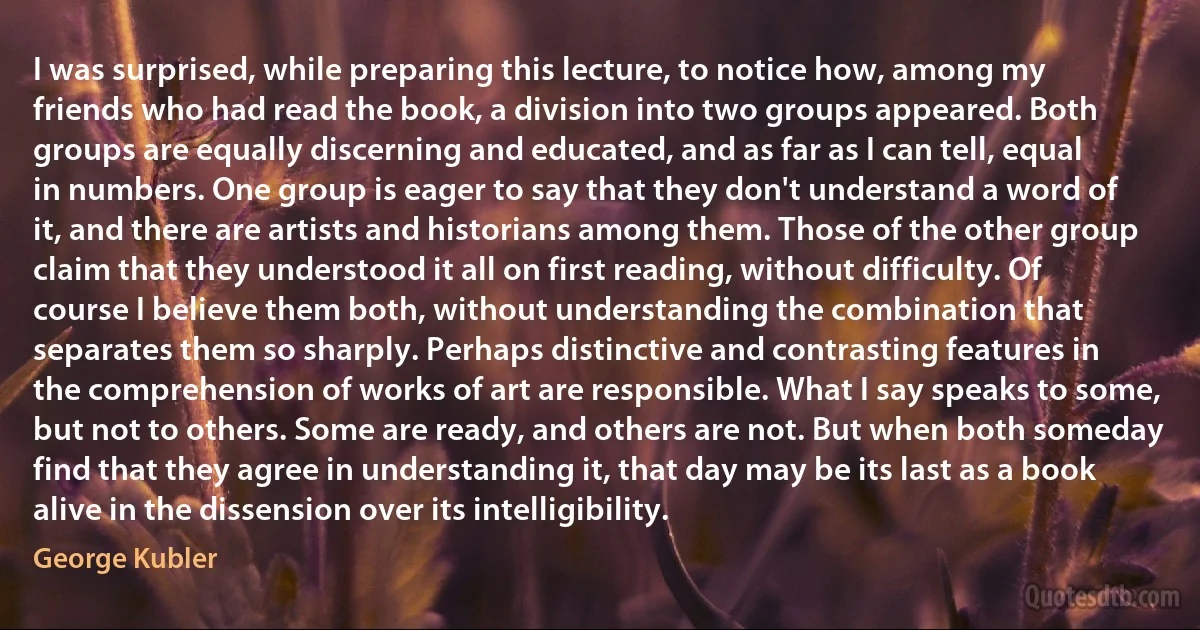
I was surprised, while preparing this lecture, to notice how, among my friends who had read the book, a division into two groups appeared. Both groups are equally discerning and educated, and as far as I can tell, equal in numbers. One group is eager to say that they don't understand a word of it, and there are artists and historians among them. Those of the other group claim that they understood it all on first reading, without difficulty. Of course I believe them both, without understanding the combination that separates them so sharply. Perhaps distinctive and contrasting features in the comprehension of works of art are responsible. What I say speaks to some, but not to others. Some are ready, and others are not. But when both someday find that they agree in understanding it, that day may be its last as a book alive in the dissension over its intelligibility.
George KublerRelated topics
art believe book claim comprehension course day difficulty distinctive equal far find last notice perhaps read reading ready say tell understanding while word others Friends worksRelated quotes
After reading your letter I feel certain that you can get all essentials without war, and without delay. I am ready to come to Berlin myself at once to discuss arrangements for transfer with you and representatives of the Czech government, together with representatives of France and Italy if you desire. I feel convinced that we could reach agreement in a week. However much you distrust the Prague government's intentions, you cannot doubt the power of the British and French governments to see that the promises are carried out fairly and fully and forthwith. As you know, I have stated publicly that we are prepared to undertake that they shall be so carried out. I cannot believe that you will take the responsibility of starting a world war, which may end civilization, for the sake of a few days' delay in settling this long-standing problem.

Neville Chamberlain
For this companion volume to A New Earth, I selected passages from the original book that felt particularly suitable for inspirational or meditative reading. For this reason I do not recommend that you read this book straight through from cover to cover. It would be far more beneficial to read, at the most, one chapter at a time, stopping at and perhaps rereading whatever passages elicit an inner response. Then let the words sink in and sense the truth to which they point, which is, of course, already within you. It can also be helpful to open the book at random occasionally, read one page or just one passage and let the words point the way to that dimension deep within that is beyond words, beyond thought. The truth to which the words point, the timeless dimension of consciousness, cannot be arrived at through discursive thought and conceptual understanding.

Eckhart Tolle
A white man's government? Not a government of intelligence, of justice, of virtue? Not a government by the consent of the governed, but a government of complexion? Where reason is skin deep? Who is a white man? Is a Spaniard? Is a Creole? Is an octoroon? Ohio says that a blood mixture of half-and-half will do for her. But if you have a qualification for the enjoyment of equal rights which vast numbers of our population cannot by nature satisfy, it is as if you made it depend upon a man's height or the color of his hair. You ask us to prefer a system of accidents to one of principles. You ask us to agree that a worthless, idle, drunken rascal, whose face might possibly be white if it could ever be washed clean enough, may be more safely trusted with political power, than an honest, intelligent, sober, industrious colored citizen.

George William Curtis
This book is about three Frenchmen who lived and wrote against the grain of these three ages of irresponsibility. They were very different men and would have been surprised to think of themselves as a group, yet they have something rather distinctive in common. All three played an important role in the France of their lifetime but lived at a slightly awkward tangent to their contemporaries. For much of his adult life each was an object of dislike, suspicion, contempt, or hatred for many of his peers and contemporaries; only at the end of their long lives were Léon Blum and Raymond Aron, for quite different reasons, able to relax into the comfort of near-universal admiration, respect, and, in some quarters, adulation. Camus, who had experienced all three by the age of thirty-five, died twelve years later an insecure and much-maligned figure; it would be thirty years before his reputation would recover.

Tony Judt
Personally, I never met Knut Wicksell. I saw him once when he delivered a lecture in Oslo, but being an unassuming student at the time, I did not have the courage to talk to him. So my knowledge of his theory came only through his writings. That, however, was a very intense and absorbing form of making his acquaintance. Already from my early student days, I read his writings (in German and Swedish) avidly. And I continued to do so later.
When I started my study on Wicksell, I found that his works were not easy reading. Often it was only at the third or fourth reading that I grasped his ideas. Invariably, each new reading made me more and more enthusiastic. Sometimes it happened that I thought I had finally caught him in an inconsistency or in unclear thinking. Every time this happened, it turned out, however, that the error was mine.

Ragnar Frisch
